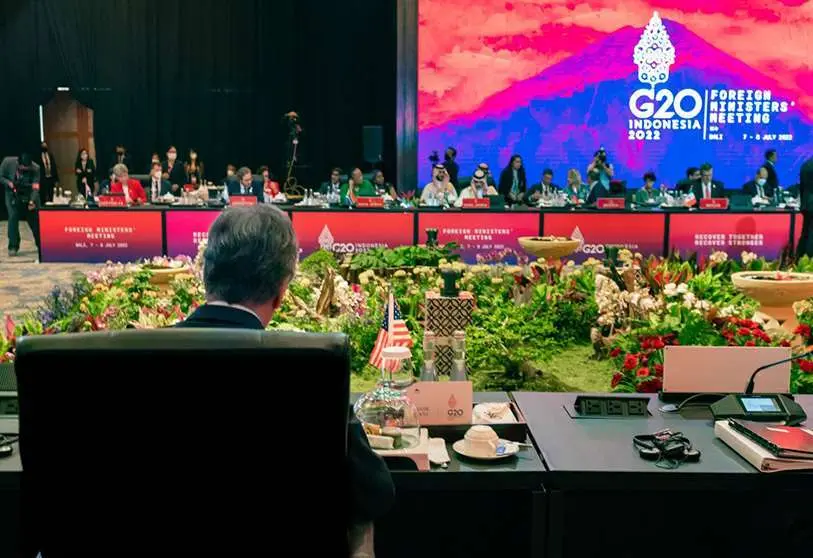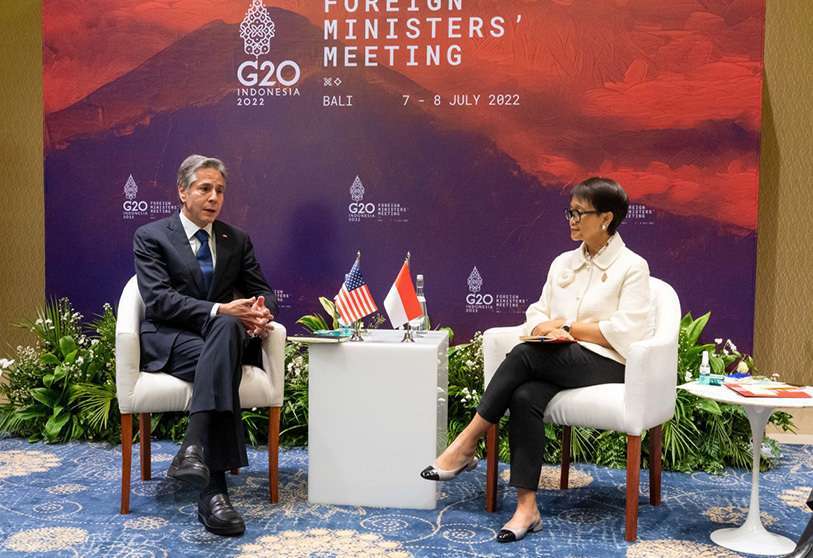Russia clashes with the West at the G20: "What we have heard today is a loud chorus from around the world about the need for the aggression to end"

The second and final meeting of the G-20 at ministerial level took place this Friday on the tourist island of Bali, in Indonesia, to prepare for the next G-20 Summit, scheduled for mid-November in the same location, but this time with the presence of the heads of state and government. Although the paradisiacal setting might have led one to believe that the meeting would go smoothly, nothing could have been further from the truth. This was the first time Putin's regime had appeared on the international stage and confronted its Western allies face to face after its invasion of Ukraine.
The elite organisation, created in 1999 to foster economic cooperation among the world's 20 richest states - in an increasingly interconnected world - has run into the most serious crisis in decades for globalisation, the motive that used to justify this annual gathering. Russia's aggression in Ukraine has provoked a new rift between West and East, reminiscent of the Cold War; but it has also generated a worrying rift between North and South, whose demands and needs no longer coincide.
The economic nature of the meeting has been overshadowed on this occasion by its diplomatic vocation, which, although informal, has taken on greater importance in a context where every support counts. Issues such as inflation, the rising cost of living, climate change and the response to the pandemic, which will mark world events in the coming months, took a back seat to the central issue: the position adopted by each state on Putin's war. Putin was represented by one of his 'strong men', veteran diplomat Sergey Lavrov, the foreign minister, who was booed on his arrival.

The tragic event that marked the second day of the G20 was, however, the assassination of former Japanese Prime Minister Shinzo Abe, the longest-serving head of government in Japan's history, after he was shot twice at a rally in Nara, near Kyoto, by a retired ex-military officer carrying a homemade gun. The event, which has shocked the world, has precipitated the return home of Japan's foreign minister, Hayashi Yoshimasa.
Sergey Lavrov travelled to Bali at the invitation of Indonesian President Joko Widodo to prepare for Vladimir Putin's visit in November. The Russian autocrat's attendance in person has not yet been confirmed, although he could appear by videoconference. The head of Russian diplomacy, for his part, preferred contact: "I'm here to get an idea of how the West is breathing". The Kremlin, which has recently succeeded in occupying the Ukrainian region of Luhansk, is trying to find support or voices in the Western bloc that are willing to abandon consensus and make concessions.
The stance of European and American foreign ministers has been unwavering. Immovable. They all once again condemned Russia's aggression and avoided taking a group photo with Lavrov. They did concede to the veteran Russian diplomat that his presence at least showed a certain willingness to make his case, to justify his actions to others. But Lavrov's eagerness to engage in dialogue vanished as soon as the German foreign minister, Annalena Baerbock, took the floor. At that point, she left the room. But not before making it clear that aggression against Ukraine was not responsible for the crisis and that sanctions designed to isolate Russia were tantamount to a declaration of war.

"The fact that [Lavrov] spent much of the negotiations not inside, but outside the room underlines that there is not a millimetre of willingness for dialogue on Russia's part," Baerbock said, later making it clear that the mood in the room was 19-1 against Russia's invasion, despite disagreements over sanctions on Putin's regime. Lavrov, for his part, replied that 'if the West does not want talks, but wants Ukraine to defeat Russia on the battlefield - because both views have been expressed - then perhaps there is nothing to talk about with the West'.
The rest of the meeting focused on persuading Moscow to allow the export of Ukrainian grain through an independently monitored 'safe' naval corridor in the Black Sea. Turkey set itself up as a major mediator several weeks ago, and led a series of talks within the UN framework, without making significant progress. Ukrainian grain thefts and export blockades are part of the Kremlin's weapons to weaken the Ukrainian economy - improving its position at a hypothetical negotiating table - and increase the cost to the West.
Ukraine's foreign minister, Dimitro Kuleba, intervened by videoconference at the meeting to call for a "global response" to Russia's invasion. "We have no right to allow Russia to continue to blackmail the world with high energy prices, hunger and security threats," he told the meeting. "What we have heard today is a strong chorus from around the world, not just from the United States but from around the world, about the need for the aggression to end," US Secretary of State Antony Blinken concluded at the end of the meeting.








